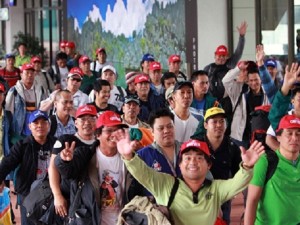OFWs in Saudi who have left original employers may still legalize stay — DOLE
MANILA, Philippines — Filipino workers (OFWs) who have left their original employers or sponsors and are now working for new employers in the Kingdom of Saudi Arabia (KSA) will still be allowed to legalize their status despite the end of the grace period for undocumented foreign workers last November 3, according to the Department of Labor and Employment (DOLE).
Citing a report from Labor Attaché to Jeddah Jainal Rasul, Labor Secretary Rosalinda Baldoz said that the Saudi Ministry of Labor would still allow correction and legalization of work status as long as employers who wish to sponsor foreign workers transferring to their companies have already complied with the Saudization requirements.
“The Saudi Labor Ministry, however, has emphasized that correction of work status at this point entails payment of fines and penalties for the delay in legalizing foreign workers’ status,” said Baldoz.
The kingdom, home to at least 1.3 million Filipinos, started stricter enforcement of its labor and immigration laws after extending two grace periods for undocumented foreign workers totaling seven months. The lapse of the second deadline on Nov. 3 signaled the full enforcement of the Saudization program, which gives priority in hiring to Saudi nationals.
The Department of Foreign Affairs (DFA) earlier said that the Saudi government was on the lookout for foreign workers with expired work permits and “iqamas” or residency permits as well as workers holding jobs outside their approved employment. The crackdown also targets employers who hire illegal workers.
The Philippine government has repatriated almost 5,000 undocumented Filipinos from Saudi Arabia in a span of more than two years since the start of Saudization, or the Saudi nationalization program.
Meanwhile, Rasul also reported that a batch of 500 undocumented workers have already been endorsed by the Consulate to the new Deportation Center in Al Shumaysi, 70 kilometers east of Jeddah, last November 10, to undergo new deportation procedures laid down under the joint undertaking between the Saudi Ministries of Labor and Interior.
The undertaking transfers the responsibility of enforcing immigration regulations, particularly those which involves violation of visa rules, from the Passport Department to the General Service Center under the Directorate General of Prisons in Jeddah.
The first batch of workers is composed of workers camping at the Tent City; 100 workers from the Bawadi Temporary Shelter rented by the Consulate, and five workers from the Bahay Kalinga.
Undocumented female workers and their children and those with medical or health conditions were prioritized.
Under the new Saudi deportation procedures, foreign workers who have not availed of the amnesty program, which ended last November 3 and who wishes to be repatriated will have to apply for exit visa and turn themselves in to the New General Service (Deportation) Center at Al Shumaysi.
There, the workers will be checked for any pending criminal case. If cleared, the workers would deposit their belongings in a special box, undergo finger printing, and would be required to secure or present their travel documents and flight bookings.
Those found with criminal records, on the other hand, will be treated separately in accordance with the Saudi criminal procedure.
The entire process should take around 48 hours, especially if flights have been booked for the workers by their respective Consulates.
Rasul also said that the Saudi government would pay for the flight home of the deportees.
“The Department of Foreign Affairs (DFA) and the DOLE’s Overseas Workers’ Welfare Administration (OWWA) are ready to provide plane tickets through the Philippine Consulate, in any case,” Baldoz stressed.
“Thus, under the new guidelines, it becomes clear that those without criminal cases can be processed through the foregoing deportation procedure, including workers with expired visas or Iqamas; those who have absconded from their employers; those working with employers who are not their original sponsors; and dependents of workers, such as mothers and children,” she said.
Related stories
Keep calm, OFWs awaiting exit from Saudi Arabia told
Gov’t speeds up Filipinos’ repatriation from Saudi Arabia
